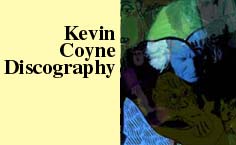PASCAL's
KEVIN COYNE HOME PAGE 
Wernr Steinhauser
Werner was Kevin's drummer from 1991 to 2004.
Interview by email by Pascal Regis, Nov 2011

When did you meet Kevin?
I think it was the end 1991, when I got a phone call from Friedl Pohrer, the bass player of Kevin´s band at that time. He was asking me if I was interested in substituting the drummer for three month. I knew not much about Kevin then, just that he was a renowned British “Rock-poet and Painter” who settled down in Nuremberg. After tree month of touring with the “Kevin Coyne Band” (which was no longer the “Paradise Band” after Hans Pukke left the band), Kevin rang me up to ask me, if I would like to become a permanent member of the Band.
Was that before he quit drinking?
No. At that time, he was already a "clean alcoholic" but still a heavy smoker. A few years later he also stopped smoking and I remember, that he occasionally mentioned, that stopping smoking was much more difficult for him than to stop drinking.
His first years in Germany were hard times? Were you witness to that?
No, as I mentioned before, I met Kevin when he already was with Helmi and this was a period of enormous creative power. Kevin didn´t talk too much about the time when he was “stranded” in Nuremberg.
Can you talk about Turpentine? How did you work together, for recording, managing the label etc.
The idea of establishing an independent label had been with Kevin for a long time before we turned the plan into reality. He was always annoyed about not having total control about royalties and payments.
The fact, that I got my own studio gave us the possibility to do recordings whenever and however we liked. And in this comfortable situation, it just seemed to be a logical consequence to do all the other requirements ourselves. With Helmi, Kevin founded the publishing company “Helmi Songs” and with me, we installed “Turpentine Records”, which is still owned by me and Helmi. At the moment, I´m producing another album with Robert Coyne.
Kevin improvising in the studio. How did that work?
In the studio, it was almost like it was on stage (apart from the audience). There was no routine or anything. Most of all was basically improvised. Sometimes, Kevin sat down at the keyboard or took the guitar, started to fiddle around a bit, and then he started to sing. It was kind of mystic from where his ideas were coming from. They seemed to appear suddenly and after a few minutes, either Kevin scrapped the idea or if he liked it, I pressed the recording button and we improvised together. Most of the songs came up like this and were recorded roughly. Here and there we added some overdubs. Sometimes we got together with other musicians and recorded in a band-situation, live. It was always like a jam session. Kevin set some cues and another song was finished. It was really incredible to work with him and I do think, that he was really a genius in this.
Was he easy to work with? I hear things ended bitterly with Hans Pukke.
All I can say about working together with Kevin is, that it was always an inspiring, influencing experience for me. I never had any problems with him. Maybe the reason was, that we both were rather congruent in terms of character, humour and musical taste.
In the early 80s, Kevin said he went "almost mad" (at the moment he recorded "Sanity Stomp"). Were you aware of that and did any of that sometimes show in his later life?
Apart from telling about those days now and then, I don´t know much of that period.
Tell me about that last tour. I remember that show in London at 100 Club. I felt like Kevin was saying goodbye to his British audience. As if most of the audience knew he would not be back
To be honest, looking back from the distance, I see it now, as if me (and may be the whole band) were not really aware about the seriousness of his disease. I think it was sort of extrusion, which was taking place in my brain. I didn´t want to see the sad truth, I guess. The last concerts, especially the very last in Hamburg (the day before he died), Kevin was always rather exhausted, but not on stage. On stage, he still was incredible. After the shows, we used a wheel chair to get him to the hotel room. I think it was kind of a miracle that we had this “day off” after the Hamburg gig and the next concert in Vienna. For that reason we decided to stay over night at home in Nuremberg, because it was on the way to Vienna. So it was meant to him to die at home.